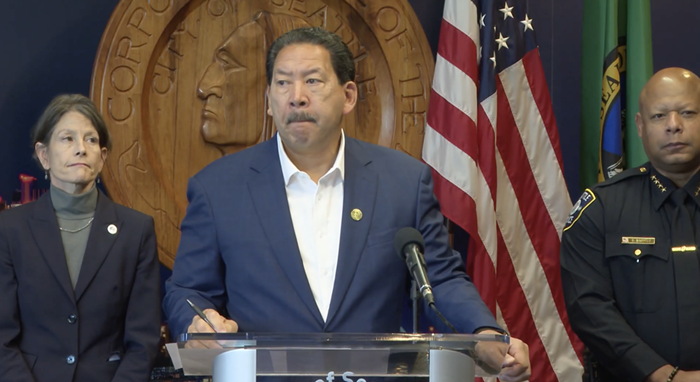Mayor Bruce Harrell and the Seattle Police Officers Guild (SPOG) have reached a tentative bargaining agreement that would allow the city to double the size of the Community Assistance Response Engagement (CARE) Department. If approved by City Council, it would make the civilian crisis response team a permanent entity within the city’s public safety system.
At a Wednesday press conference, less than two weeks before election day, Harrell said the agreement removes a cap on hiring, allows direct dispatch of responders, strengthens police accountability, and streamlines the disciplinary process.
“This contract that we’ve been able to negotiate and almost get it across the finish line with some council work really moves the CARE Department…from a promise to public safety to a complete paradigm shift,” Harrell said at the press conference.
The key word here is “almost.” Negotiations aren’t over. And even once negotiations are complete, it still requires City Council’s approval. The announcement is a bit of a premature victory lap, but should the agreement be approved, it would mean CARE might actually be able to do the job they were created to do.
CARE was established as a pilot program in 2023 with significant restrictions imposed by the memorandum of understanding (MOU) between the city and SPOG. It capped CARE at 24 staff members, and required dispatch to send the same number of officers to calls even when CARE responded. It gave SPD ultimate authority on any call they shared with another responder, and the power to tell CARE not to respond. Under these restrictions, SPOG was able to nullify CARE’s goals while reinforcing SPD’s capacity to negotiate higher salaries and benefits with the city.
This agreement doesn’t allow CARE to act independently, but it does lift several of the tightest restrictions. It allows the city to grow the CARE team to 48 staff next year, doubling its manpower. And it expands the types of 911 calls that CARE responders can be dispatched to, including some “low-acuity” calls that they can respond to without the company of a police officer.
These concessions came at a cost. The agreement, of course, also gives the Seattle Police Department’s already bloated budget a major funding boost. Harrell said SPD will hire more police officers in 2025 than in 2024 and 2023 combined, adding that the agreement provides incentives for officers, including raising the base salary to $118,000, and paying premiums for those with associates and bachelors degrees and bilingual officers. According to Publicola’s reporting, the base salary would increase to $126,000 after six months on the job.
At the press conference, CARE Chief Amy Barden explained how the department has been operating under “pretty severe” restraints from the Seattle Police Officers Guild. “When we are talking about human suffering, we need to do better, and we need to demand better,” Barden said. “The status quo is unacceptable. The historic pace and process of bureaucracy is unacceptable.”
SPD Chief Shon Barnes said the city has made “tremendous strides” in public safety and supporting its police officers, and commended the negotiation between the city and SPOG. He added that he supports CARE’s work, their ability to solo-dispatch, and approves of the accountability alignment with the 2017 ordinance.




